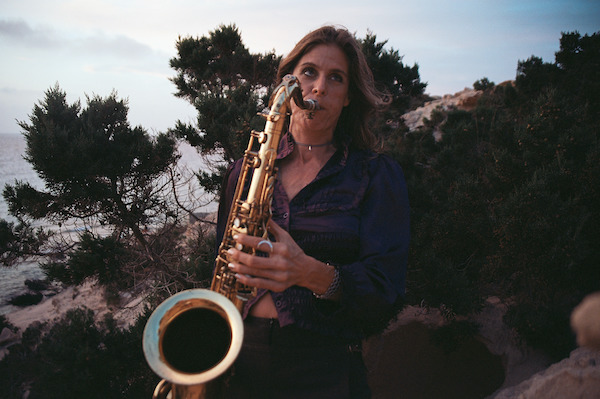Jan 13, 2026 2:09 PM
More Trump-Kennedy Center Cancellations
The fallout from the renaming of the John F. Kennedy Center for the Performing Arts to include President Donald…

Muriel Grossmann has lived all over Europe and draws influences from music of African origin.
(Photo: Courtesy RRGEMS)Muriel Grossmann characterizes her quintet’s latest album, Reverence, as a spiritual-jazz effort—the sum of her devotion to a lifelong exploration of rhythms, particularly those of African origin.
The album is Grossmann’s attempt to combine what she calls the “reassuring elements of spiritual-jazz” and its antecedents. “Spiritual-jazz has its roots in African music, modal jazz, gospel, blues, free-jazz and Eastern music,” she said. And her explorations of African music and its percussion have helped forge her connection with polyrhythms.
“Every part of the African continent has a very specific sound set and focus points, but the way to play it is very similar to jazz,” said Grossmann. “I was always interested in composing melodies that were part of the polyrhythmic structure, making the band sound like a drum.”
Born in Paris and raised in Vienna, Grossmann traveled to Tunisia and Morocco as a child; her first instrument was flute, which she studied for more than 15 years, before switching to alto and soprano saxophone. She’d been performing in r&b, funk and world-music bands, but when she moved to Barcelona in 2002, her career as a leader and recording artist began in earnest. She’s been living in Ibiza since 2014.
Reverence opens with a wild percussive sound and eventually breaks into the wide-open melody of “Okan Ti Aye.” “Union” conjures Alice Coltane’s meditative moods, juxtaposed with freer horn lines, while “Chase” is a meditation on call-and-response.
“My deeper involvement in spiritual-jazz started in 2011 when I recorded the composition ‘Peaceful River,’ a marker for what I wanted to do next,” said Grossmann. The albums Earth Tones, Natural Time, Momentum and Golden Rule—recorded consecutively from 2015 to 2018—moved her more toward that center. On Reverence, most of the droning backdrops are performed by the bandleader, who largely goes uncredited on everything from Celtic harp to ngoni.
“We use them to color the ambient sound of the quintet or quartet. This time, I use a lot of instruments of African origin,” she said, pointing to balafon, krakebs and kalimba.
Grossmann also mentioned 1974’s Soul Of Africa by Hal Singer and Jef Gilson as “a great spiritual-jazz record with African influence. Hal Singer just turned 100,” she said recalling how Singer’s beginning as a tenor r&b player eventually led him to the roots of rhythm.
“Maybe because I live in Europe or particularly in Spain, I can generally say, ‘I am happy to live in a time where so many are starting to understand the human race as it is, one race, where gender doesn’t matter,” she said, discussing the lack of resistance in her pursuit of African and African American music. “African music is at the root of so much music.”
Reverence is Grossmann’s way of giving thanks for those roots. DB

Belá Fleck during an interview with Fredrika Whitfield on CNN.
Jan 13, 2026 2:09 PM
The fallout from the renaming of the John F. Kennedy Center for the Performing Arts to include President Donald…

Peplowski first came to prominence in legacy swing bands, including the final iteration of the Benny Goodman Orchestra, before beginning a solo career in the late 1980s.
Feb 3, 2026 12:10 AM
Ken Peplowski, a clarinetist and tenor saxophonist who straddled the worlds of traditional and modern jazz, died Feb. 2…

The success of Oregon’s first album, 1971’s Music Of Another Present Era, allowed Towner to establish a solo career.
Jan 19, 2026 5:02 PM
Ralph Towner, a guitarist and composer who blended multiple genres, including jazz — and throughout them all remained…

Rico’s Anti-Microbial Instrument Swab
Jan 19, 2026 2:48 PM
With this year’s NAMM Show right around the corner, we can look forward to plenty of new and innovative instruments…

Richie Beirach was particularly renowned for his approach to chromatic harmony, which he used to improvise reharmonizations of originals and standards.
Jan 27, 2026 11:19 AM
Richie Beirach, a pianist and composer who channeled a knowledge of modern classical music into his jazz practice,…